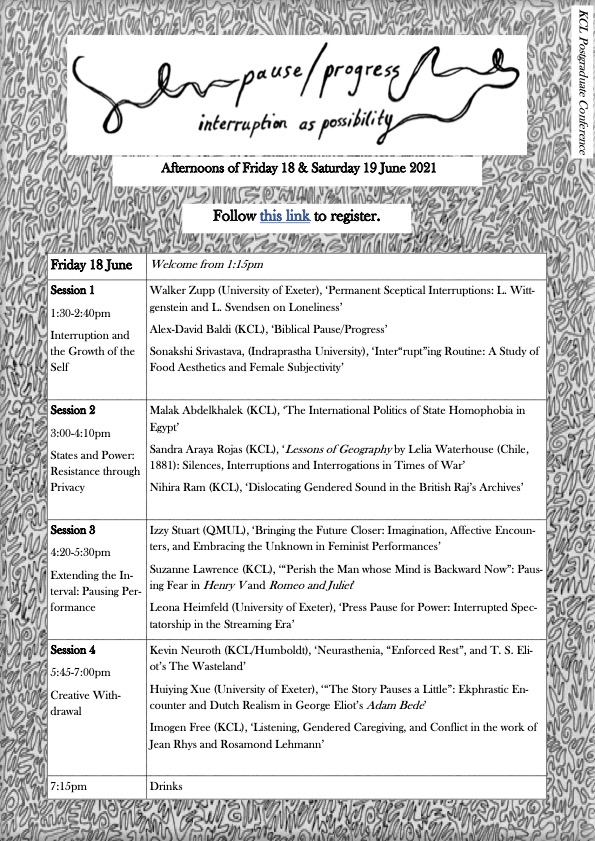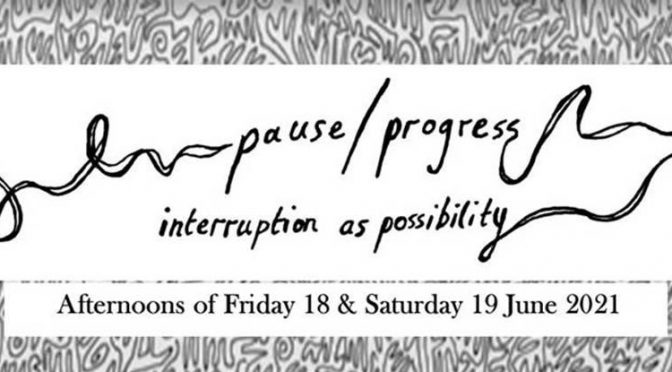By George Kowalik (editor)
Back in March, the department’s PGR community received an email about an upcoming in-house conference. June’s event would be the first time the annual conference had taken place online, and this year papers would be on the theme of “pause/progress: interruption as possibility.”
As the call for papers highlighted,
The past year has forced us all to think about the way we work, and work to find new ways to think. This conference aims to explore and interrogate how moments of pause, hiatus, or delay might be critically or creatively generative, and allow us to rethink what we consider progress. The question of what comes next has never been more vital. Bringing together postgraduate researchers and creative writers, we aim to create a productive conversation across disciplines, sharing work that embraces both possibility and challenge.
The programme of presentations honoured this stimulation of ideas and then some. Events were spread over the afternoons of Friday 18th and Saturday 19th June, either side of a frustrating England vs. Scotland football match that we have all completely forgotten ever happened, which cannot be said for the pause/progress conference. Day one got off to a wonderful start with Walker Zupp’s discussion of ‘Permanent Sceptical Interruptions: L. Wittgenstein and L. Svendsen on Loneliness.’ Walker was one of a few PGRs based outside of King’s and joined us from the University of Exeter, giving a fascinating paper that raised questions about the possibility that scepticism and loneliness are inextricable, the possibility that the premise of Wittgensteinian ‘language-games’ may separate and isolate as much as they organise and connect.
This first panel – titled “Interruption and the Growth of the Self” – also saw exciting work from Sonakshi Srivastava on ‘Inter“rupt”ing Routine: A Study of Food Aesthetics and Female Subjectivity.’ It is immensely difficult to select highlights from such a varied, dynamic, engaging set of presentations, but day one also saw great papers from Malak Abdelkhalek on state homophobia in Egypt, Leona Heimfeld on streaming services and our culture of distraction, Kevin Neuroth on T. S. Eliot’s ‘The Waste Land’, and Imogen Free on the work of Jean Rhys and Rosamond Lehmann. Kevin’s talk touched on the idea of reading Eliot’s seminal modernist poem as a pandemic text, imbued with the conflict between space and confinement, scope and hermeticism. Imogen’s, which closed the day in excellent fashion, juggled the act of listening, the idea of redefining noise in the twentieth century, and the tension between orality and aurality.


Day two saw my own paper on ‘Post-postmodernism, the Postracial, and the “Afterlife of Slavery” in Percival Everett’s Erasure’ and Nicholas Chua Bingkai’s discussion of Ng Yi-Sheng’s Lion City, both for the “Interrogating the ‘Post’ and Narratives of Progress” panel. Nicholas’ paper unpacked Lion City within the context of colonialism, touching on the success of the book and its relationship to our historic moment of “decolonising” academic curriculums.
Later in the day, attendees were treated to a performance piece from Isobel Marshall, Catherine Kelly’s thoughts on Monique Wittig and Theresa Hak Kyung Cha, Sam Bradley’s paper ‘“It is an Affair of Origin”, or, Queer Women Writers and the Country Houses they Love a Little Too Much’, and a keynote lecture from Professors Elizabeth Freeman (UC Davis) and Ellen Samuels (UW Madison) on Crip Temporality.
All in all, the conference was a resounding success, and was full to the brim of exciting research happening at King’s and within the wider academic community. Beth Potter, Felix Antelme, and the rest of the organising team completely outdid themselves. The conference offered a warm, supportive environment that facilitated mutually beneficial conversations amongst researchers and the invaluable platform to present work and receive useful feedback on it.
With the 2021-22 academic year creeping up on us already, and a less restrictive term ahead of us regarding being able to work on campus and interact with one another face-to-face, the virtual conference model might not be needed by the time the next departmental PGR conference swings around. But thanks to the superb handling of it this year, it would be far from a problem if it still is.
Blog posts on King’s English represent the views of the individual authors and neither those of the English Department, nor of King’s College London.
You may also like to read:

